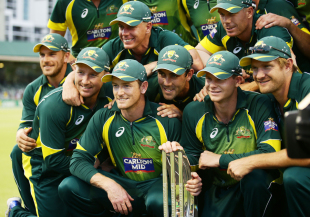Carlton Mid Tri-Series in 2014-15
Dean Wilson

|
|||
|
Related Links
Series/Tournaments:
Carlton Mid One-Day International Tri-Series
|
|||
1 Australia 2 England 3 India
On one level, this triangular series between world cricket's Big Three was a reminder of their increasing mutual reliance. But, for the players themselves, it was useful preparation for the World Cup a fortnight later, of which the Australian games would be played on the same grounds, under the same conditions. The exception was the absence here of DRS, which India objected to because it was "not 100% accurate", despite the fact that they and everyone else were about to use it in the World Cup.
Australia's focus had switched from reclaiming the Border-Gavaskar Trophy to reclaiming the World Cup, but they remained uncertain about the identity of their captain. Michael Clarke had suffered another hamstring injury during the Test series against India, and his one-day deputy, George Bailey, was battling form and the perception that he was fortunate to be in the 15-man squad at all. Clarke sat out the tri-series to rebuild his fitness, while Bailey and the young pretender Steve Smith led Australia on an unbeaten run to the trophy, culminating in a straightforward victory over England in the final at Perth.
The format provided ample opportunities for Australia to rest and rotate first-choice players such as Mitchell Johnson and David Warner, and find out more about those on the fringes. That allowed Mitchell Starc to establish himself as perhaps the world's most devastating white-ball practitioner, demolishing England and India in the first two games; Glenn Maxwell blossomed to the extent that Australia eventually felt confident enough to use him as their sole spinner. They were by far the most powerful of the teams, and the selection of three left-arm seamers in the final (Johnson, Starc and James Faulkner) provided a taster of their successful tactics at the World Cup.
Not that England took much notice, arriving with a squad of six right-arm seamers and three off-spinners. They did not look especially confident setting a score. But a pair of successful run-chases against India gave them something to cling to following a difficult series in Sri Lanka before Christmas, which had triggered the dismissal of captain Alastair Cook. Eoin Morgan, his replacement, made 121 in the first game, against Australia at Sydney, but just two more runs in his next three innings. (Morgan also had to deal with a failed extortion attempt by an ex-lover's former boyfriend, who emailed the ECB threatening to release explicit images unless they coughed up £35,000.)
Ian Bell, entrusted with Cook's old opening slot ahead of the inconsistent but potentially destructive Alex Hales, crashed 141 off 125 balls against Australia in Hobart, and finished as the competition's leading run-scorer, with 247. James Taylor chipped in from No. 3 with two hefty scores against India, and Chris Woakes bowled fast with the new ball, creating the impression that England had settled on their World Cup formula - only for Taylor and Woakes to be shifted from their roles when the tournament began.
India's seam bowling improved from their 2-0 Test defeat by Australia, but they were unusually sketchy about their batting plans, holding Virat Kohli back from No. 3 if an early wicket fell. Two months into their tour, they ended the competition without a win in eight games. "What is important right now is a break," said captain M. S. Dhoni. "Lock the kitbag [away]. Keep it somewhere you don't even want to see it, and completely switch off from cricket." When India did start winning during the World Cup, their team director Ravi Shastri was scathing about the relevance of this tournament: "Frankly speaking, I believe this tri- series was a sheer waste of time and energy."
Ultimately, Australia were too good for the cricket to be earth-shattering. There was just one truly close game among the seven, at Hobart, where England failed to beat what was essentially a second-string Australian team sprinkled with a few senior pros. It was a supremacy Australia would ram home over the next few weeks.
Match reports for
1st Match: Australia v England at Sydney, Jan 16, 2015
Report |
Scorecard
2nd Match: Australia v India at Melbourne, Jan 18, 2015
Report |
Scorecard
3rd Match: England v India at Brisbane, Jan 20, 2015
Report |
Scorecard
4th Match: Australia v England at Hobart, Jan 23, 2015
Report |
Scorecard
5th Match: Australia v India at Sydney, Jan 26, 2015
Report |
Scorecard
6th Match: England v India at Perth, Jan 30, 2015
Report |
Scorecard
Final: Australia v England at Perth, Feb 1, 2015
Report |
Scorecard

